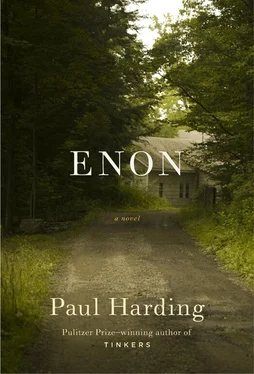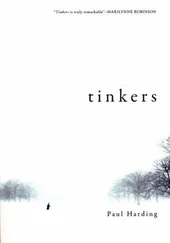I imagined Kate standing at the top of the hill, under the occluded sky, drawing her hair back because the wind kept blowing it across her face, looking across Enon to where I crouched at the door.
“Mr. Wallace had an operation, Dad. He needs those pills.”
“I know, Kate. I’m sorry.”
The moon shone above the hill for a moment and Kate turned away and disappeared down the back slope.
I pushed on the kitchen door with my left hand and pulled on the doorknob at the same time, so the door would not swing when the deadlatch cleared the strike plate. My hands sweated in the rubber gloves and felt clammy.
This is all just so ridiculous, I thought. The cool, fresh air gusting into the room smelled minerally and wholesome, and I wished that it contained all the nutrition I needed, that the spices distilled into the wind from the water and salt and rocks and earth and foliage of Enon could be the food that sustained me and the medicine that healed me. I cursed my loopy imagination and my weak will, the cramps knotting and unknotting in my guts, and inched the door open a crack.
Even in the dark, the kitchen glowed white. It was a large, tiled space, full of large white cabinets and old industrial-grade white appliances. The white enameled-iron sink was practically the size of a bathtub. I tiptoed over to the kitchen table. My eyes acclimated to the dark, and the objects on the table resolved themselves against the tablecloth, which had a blue-and-white alternating pattern of springer spaniels, mallards, and cattails. A gold pair of wire-rimmed spectacles had been placed on top of a couple of garden catalogs. There was a lined notepad, with a pen laid next to it and a note written in clear, elegant handwriting: Amanda and kids, Fri., 1:30, grapes for Arthur . I felt like a ghost, listless and confined, wandering in a house that had been mine a century ago, relegated to examining the details of the lives of strangers.
The refrigerator motor started with a clank and a man’s voice called from deeper in the house, “Joan?”
Adrenaline burst inside me, and the cravings that I’d forgotten for a moment rang and buzzed again, and I nearly screamed and began rampaging through the house, knocking over vases and chairs and smashing through cupboards, so whoever had spoken would know for certain that he had heard another living person in the house, a stranger, an intruder, and not have to wonder whether he’d heard a ghost. But then I saw a lazy Susan on the countertop next to the sink with twenty or thirty prescription bottles on it. Nothing moved, and the voice did not call again. Euphoria swelled over me and, after peering through the telescoping doorways and rooms beyond the kitchen, I treaded to the bottles in a kind of antic half-fit. There was also a small silver tray with another dozen of the white-capped, brown plastic bottles, a sheet of paper on which a dosage schedule was printed, and a large diamond ring. I checked the bottles on the tray first. There was a prescription for fifty muscle relaxants and, a miracle, a prescription for seventy high-dose instant-release painkillers. I stuffed the bottles in the pockets of my sweatshirt. They rattled like little maracas and I shook them in my pockets, once, twice, three times, and whispered, “Cha, cha, cha, I’m Car-men Mir-and-a .” I didn’t recognize the other drugs, so I gave the wheel of the lazy Susan a quick quarter turn and looked at the next batch. There was a bottle with forty Valiums, past their expiration but still potent. I picked up all the bottles from the middle of the wheel and lined them up along the counter, as if they were on a production line in a factory. There were more muscle relaxants, a couple dozen more Valiums, and another forty less potent and, as I thought of drugs past their expiration dates, somewhat stale painkillers. I opened the cabinet directly above the pills. It was full of expensive vitamins and supplements and a bottle of cough syrup with codeine, which I pocketed. Some inexplicable, pathetic, giddy sense of respect seized me and I began to put the other medicines back on the wheel. I was shimming the last couple of bottles in among the others when the man called out again—“Joan?”—directly behind me. I startled and the bottles scattered across the table.
“Joanie, hon? The dressing is all messed up again.”
I turned around, terrified, certain the police must already be pulling up to the house. An old man — Mr. Wallace — stood, bowlegged and bent forward, with his two hands holding his stomach under his pajama top. He seemed so much older and thinner and frailer than I had remembered him. I hadn’t seen him in six or seven years, since I’d taken care of his lawn for that one summer. His mouth hung open, slack, and a last few wisps of white hair stuck out from the sides of his head. When he saw that I was not his wife, his expression didn’t change.
“Are you my brother?” he asked.
“No,” I whispered. “No, I’m not your brother.” His expression remained the same.
“Are you my son?”
“No; no, Mr. Wallace. I’m not your son.”
“Are you my neighbor, with the barking dog?”
“No, Mr. Wallace,” I said. “I’m Charlie.”
“Oh. Charlie. Huh. Charlie, I’m awfully sorry, but I don’t remember you. It’s the old noggin; goddamned screen door.”
“Water through a sieve, Mr. Wallace,” I whispered, and tapped the side of my head with a forefinger.
“Say, Charlie, could you help out an old fellow airman? The woman who lives upstairs is out, and I’ve got this damned dressing messed up again, and these staples.”
Mr. Wallace lifted his pajama top, and I could see a large bandage that he had managed to peel half off. There seemed to be fresh blood on the bandage and blood soaking the elastic waistband of his pajama bottoms.
“I think you need to sit down, Mr. Wallace,” I said. I peeled off the rubber gloves and wiped the sweat off my hands, took Mr. Wallace by an elbow, and guided him to the kitchen table. I helped him onto a chair. The bandages smelled sour.
“It’s these staples. I don’t know how they got here, but they need to be out,” he said. A line of staples held together a black incision along his gut. Blood seeped from the cut and some of the staples looked crooked, as if Mr. Wallace had been trying to excavate them.
Why the hell is this guy home, I thought. There must be a nurse here, or somebody. How the hell is this guy sitting here alone in his study or whatever it is back there, picking at these staples? It struck me what an awful thing it was to be stealing this man’s drugs. Worse, it struck me that it hadn’t struck me before, that I was so caught up in the undertow of narcotics and alcohol and grief, I hadn’t even thought about the actual person in actual pain, from whom I was stealing. I’d imagined Kate thinking of it, and reminding me, but I’d even ignored that. I made a quick calculation that Mrs. Wallace would call the police no later than, say, seven or eight in the morning, if Mr. Wallace didn’t wake her after I’d left, and that she’d be able to get a new prescription by no later than noon, and probably earlier.
“Oh, no. No, Mr. Wallace,” I whispered. “You can’t pick at that. The doctor says you have to keep the dressing on. You won’t get healed if you keep pulling at it.” (I’d said the same thing to Kate many times, when she’d been a little girl and had had a hysterical, irrational terror of bandages, and had preferred to let her cuts bleed, no matter how bad they’d been, rather than cover them.) I grabbed around in my pockets and found the bottle with the strongest medicine. I tapped eight pills onto the table. I opened another of the bottles, poured the remainder of the strong prescription into that, plinked the eight pills back into the first bottle, and placed it on the table.
Читать дальше












